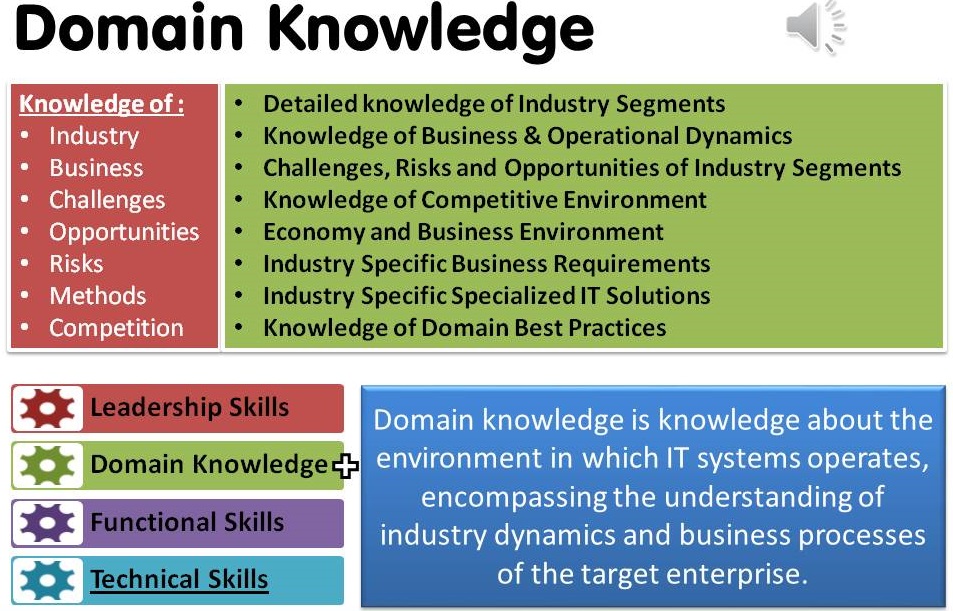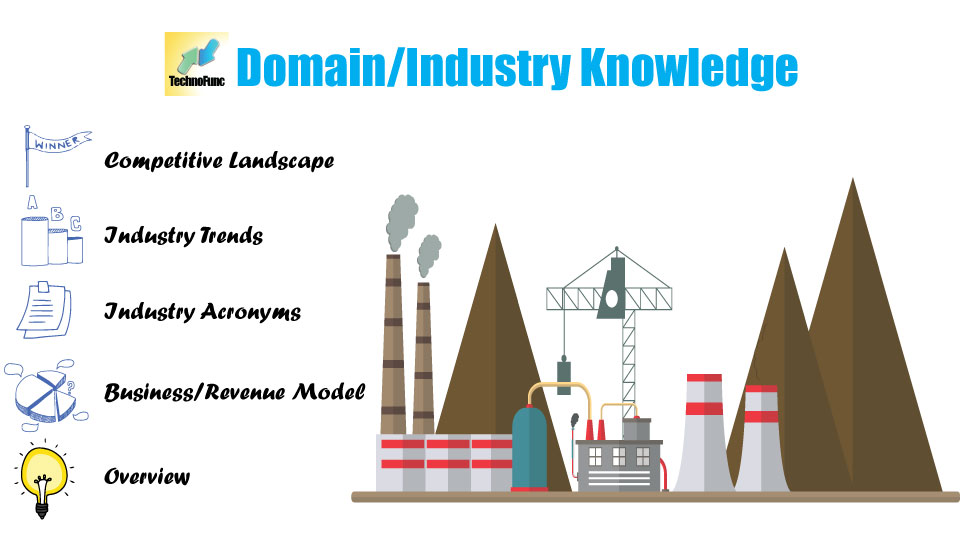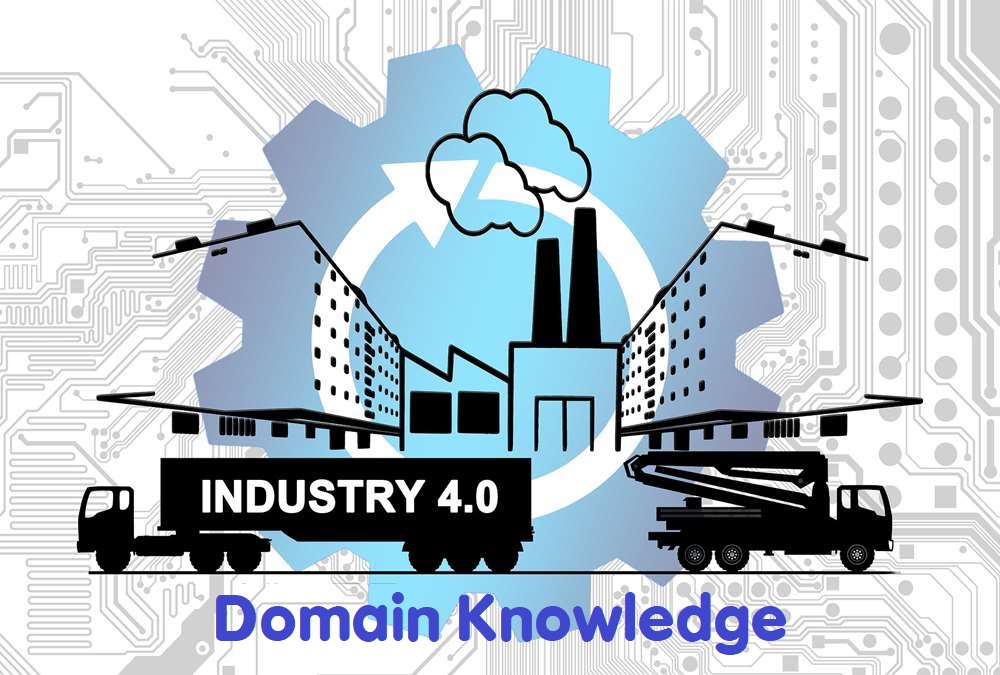- Home
- Business Processes
- Industry Knowledge
- Aerospace Industry
- Automotive Industry
- Banking Domain
- BFSI Industry
- Consumer/ FMCG Industry
- Chemicals Industry
- Engineering & Construction
- Energy Industry
- Education Domain
- Finance Domain
- Hospitality Domain
- Healthcare Industry
- Insurance Domain
- Retail Industry
- Travel and Tourism Domain
- Telecom Industry
- Leadership Skills
- eLearning
- Home
- Leadership
- Career Management
- Building Your Domain Knowledge
Building Your Domain Knowledge
Domain knowledge from a career management perspective encompasses the understanding of industry dynamics and business processes of the target operational area. Domain expert exhibits clear knowledge in the respective industry and understands the industry concepts in general. It is always recommended to best highlight your exposure of domain in your resume or cover letter. TechnoFunc provides you with the best tutorials to gain domain knowledge in a large number of industries and business areas.
One of the problems with expertise is that people have it in some domains and not in others.
- Daniel Kahneman
What is Domain?
Have you ever been asked this question in an interview – What is the domain in which you are working?
As per the dictionary definition of the domain, it is an area of territory owned or controlled by a particular ruler or government. In computing terms, a domain represents a distinct subset of the network with addresses sharing a common suffix or under the control of a particular organization or individual. A domain contains a group of computers that can be accessed and administered with a common set of rules. In the context of career management as the domain will refer to a specific, specialized discipline or field for example banking domain or insurance domain or software domain, or ERP Domain.
What do we mean by Domain Knowledge?
Domain knowledge is knowledge about the environment in which any organizational system operates. From a career management perspective, it encompasses the understanding of industry dynamics and business processes of the target operational area. For the software developer and tester, domain Knowledge is the knowledge of the environment affecting IT systems decisions and implementation environments. For a person interested in becoming a domain expert, it is the knowledge of a specific, specialized discipline or field like banking or travel industry which use different terminologies, have different processes and metrics and operational mechanisms. People who have domain knowledge, are often considered specialists or experts in the field.
In contrast to general knowledge, it is very specific knowledge that can be applied in a particular context. This knowledge includes business model, business terminology, competitive landscape, domain-specific processes, domain-specific procedures and policies, user workflows, data pipelines. Operations on domain knowledge are performed by meta-knowledge.
Domain knowledge is the knowledge about the environment in which the business organizations operate, and a domain expert exhibits clear knowledge in the respective industry and understands the industry concepts in general.
What is a Domain-Independent Knowledge?
Domain independent knowledge is a term mostly used for a more general discipline, as, for example, knowledge of programming, or knowledge of change management skills or project management skills will be applicable to all industries with minimum variations. Whereas the business models for these industries will be entirely different.
Domain Knowledge for Software Developer & Tester
In software engineering, domain knowledge is knowledge about the environment in which the target system operates. Software developers usually learn this knowledge from the software users in the domain who are also called domain specialists, domain experts, or subject matter experts.
The major difference between a novice and a person with domain knowledge is the value that the expert brings in. A novice software developer or tester can get the job done but a domain expert can add value to the entire process by making suggestions around bringing effectiveness, efficiency, or operational excellence to the process.
A tester or developer who has a good understanding of the core functionality of the software being deployed and has a good understanding of how the business operates can easily understand and interpret the requirements, provide feedback or suggestions for improvements, and guide the team on important decisions and help create innovative and sustainable solutions that can drive outcomes for the business.
What is the difference between functional knowledge & domain knowledge?
Generally, people think that functional knowledge and domain knowledge is the same. As explained before, Domain knowledge is the knowledge about the environment in which any organizational system operates. Domain Knowledge is the knowledge of a particular industry. Domain knowledge encompasses an understanding of the industry dynamics, history, sectors and segments, business model, competitive landscape, value chain, customers, supply chain, challenges, and the industry-specific strategies of the target enterprise. From a career management perspective, it encompasses the understanding of industry dynamics and business processes of the target operational area.
Functional knowledge is the knowledge of a particular function like human resources, accounting, finance, etc. Functional knowledge provides keenness and quickness in understanding and dealing with a business situation in a manner that is likely to lead to a good outcome. The term "business acumen" is the knowledge and understanding of the financial, accounting, marketing, and operational functions of an organization. The same knowledge can be included in different domains like logic and mathematics
An expert is one who knows more and more about less and less.
- Nicholas Murray Butler

Domain Knowledge in Resume
Mention of relevant domain skills in your resume can help build your credentials and help you with exploring your dream job. It is always recommended to best highlight your exposure of domain in your resume or cover letter. Many employers today while passing instructions to their talent management teams demand specifically to target candidates who have exposure in a particular industry domain. Also when you get the opportunity to work for a new industry try to go deep to understand the business model and keep improving your domain knowledge along with your technical or functional skills.
What is the importance of domain knowledge?
Talent managers and hiring managers to recognize that to be successful in today’s competitive world we need to invariably develop domain knowledge, either in a new industry, such as health or insurance, or a new business function, such as marketing or supply chain management.
Domain knowledge is the knowledge of Industry and Business. Most domains have industry-specific best practices and variance. Gaining business acumen and domain expertise provides the ability to make good judgments and quick decisions and empower the executives to deal with complex business situations. Gaining an understanding of the industry means a more thoughtful analysis, clearer logic underlying business decisions, closer attention to key dimensions of implementation and operation, and more disciplined performance management.
Communicating between end-users and software developers is often difficult. They must find a common language to communicate in. Developing enough shared vocabulary to communicate can often take a while. Good domain knowledge will equip you with the understanding of the key challenges and risks and opportunities; faced by the industry in general and business in particular. It will provide you an understanding of specific methods applicable to business and also the knowledge about the competition and their advantages.
We as professionals work for these enterprises and provide various solutions that need to be tailored to the unique demands of the target industry and its dynamics. For our solutions to be sustainable and effective they must be designed keeping in view the present and future dynamics of the industry and that can be achieved only by having a domain and business understanding of the particular industry/business.
What is meant by Domain Excellence?
Given below are the attributes of a professional who has gained domain excellence in the area:
1. Business Orientation:
- Shows clear interest in the respective industry and understands the industry concepts in general
- Supports and follows the developments in the respective industry (e.g. business update, press)
2. Risk Awareness
- Understands the relevance of risk minimization and the importance of risk management
- Shows clear awareness of business risks reflecting on own behavior
- Is acting risk-aware
3. Compliance
- Is aware of the seriousness in compliance with regulations and formalities
- Shows clear awareness and acts as a role model for compliance
How to learn Domain Knowledge?
Domain knowledge is a detailed understanding of a particular process, activity, or industry and used to describe the knowledge of experts in a particular area. Lack of experience in the domain might get in the way of you meeting your career objectives and growth. To gain expertise on a particular domain one should focus on:
- Gaining detailed knowledge of Industry Segments
- Gaining knowledge of Business & Operational Dynamics
- Understanding Challenges, Risks, and Opportunities of Industry Segments
- Gaining knowledge of Competitive Environment
- Keeping yourself in touch with the Economy and Business Environment
- Understanding the industry Specific business requirements
- Knowledge of Industry Specific Specialized IT Solutions and offerings in the marketplace
- Knowledge of domain best practices
Building Domain Expertise
Domain expertise is the knowledge and understanding of the essential aspects of a specific area of business. Each industry is different when it comes to their way of business; hence they require folks with a skill set that can bring both technical and a business perspective.
As an example, if one is working for the healthcare industry, before working on the solution he should be aware of the healthcare terminology like inpatient, outpatient, types of different hospitals, the business models of various healthcare providers, etc.
Essentially to be a domain expert, one should build a good understanding of the input and output, and the operational business model of the industry and how it generates value for its customers. A good Domain Expert will have an in-depth understanding of the industry processes, its products and features, and the ability to propose a solution understanding and articulating its unique challenges and business requirements.
How TechnoFunc helps?
We have several courses spanning multiple industries that provide you with an overview of various industries, their operational dynamics, and their unique challenges. TechnoFunc provides you with the best tutorials (made of articles and videos) to gain domain knowledge and business acumen in a large number of industries/businesses. Browse industry-specific tutorials by clicking on the image for the industry of your interest.
When you want to do your career planning and as part of the same want to move to a different domain you may feel incompetent or overwhelmed with the idea of changing industry or business domain.
Rather than going through an effort-intensive process of trying to seek advice and input from a variety of sources, and thereby getting the required exposure, we recommend you go through the following articles and tutorials specific to your domain which will expose you to terminology, business model, data points and diverging ideas which have been compiled by domain experts from the individual industry that will open many more new professional possibilities for you.
As you start a new project, whether you’re already familiar with or new to a business domain, make a point to explore these articles by TechnoFunc to gain different perspectives on the problem you’re trying to solve. Taking this approach will help you look at situations more holistically and examine issues from all perspectives, which in turn yields ideas for more creative outcomes. As you gain more industry or business domain expertise, you’ll find yourself making larger contributions to your project.
Explore Our Domain / Industry Tutorials:
- Aerospace Domain
- Automotive Domain
- Banking Domain
- BFSI Domain
- Consumer / FMCG Domain
- Chemicals Domain
- Engineering and Construction Domain
- Energy Domain
- Education Domain
- Financial Management & Business Dynamics
- Global Markets Domain
- Hospitality and Leisure Domain
- Healthcare Domain
- Insurance Domain
- Technology Domain
- Retail Domain
- Travel Domain
- Telecom Domain

Outside of their particular area of expertise scientists are just as dumb as the next person.
- Richard P. Feynman
Domain Knowledge Questions
Many companies today want to assess their candidates on domain expertise. Most of the modern job-profiles demand more specialized skill sets and employees want to assess their potential candidates on functional skills and domain capabilities. TechnoFunc has created domain-based assessments to help organizations measure a wide variety of industry skills and help students take domain knowledge tests and gain certifications. This helps candidates to do a self-assessment for evaluating themselves for a particular domain or a functional process area. Recruiters can evaluate the expertise of job seekers with the expert-curated questions provided in these domain-based assessments. The questions are presented in the form of multiple-choice and multiple answers. These TechnoFunc Domain Tests can also be used in employee development to facilitate the up-skilling of employees. The test results provide clarity on the areas that need improvement, which helps to create personalized training programs for workforce development as per industry standards.
Related Links
You May Also Like
-
Stress is a product of the busyness of modern life. It has assumed grave dimensions ever since the emergence of industrialism. In fact, stress is a natural, ongoing, dynamic, and interactive process that takes place as people adjust to their environment. Stress can be brought about by positive or negative life events. Distress can cause disease and eustress or positive stress can promote wellbeing and increased productivity. Learn to recognize and be responsible for your stress, and learn the ways to manage stress.
-
“Level 5 Leadership”, this term was coined by Jim Collins in his book “Good to Great” and it is all about achieving "Greatness" as a leader. This article will explain what we mean by Level 5 Leadership and what the characteristics of a Level 5 leader are. What it takes to achieve greatness as a leader, and what are the steps and strategies that one can use to move up to this top level of leadership.
-
Discover Your Career Direction
The process of finding career direction begins with specific career exploration and identification of a career that could be passionate about, a career that allows you to make the optimum use of your talents. After identification of the career, you need to acquire skills and tools, and education that can help you get entry into your dream career. Learn the important tips that you cannot afford to miss.
-
Guide to Technical Leadership Skills
Technical leaders care about building amazing products and the best technical capabilities in their teams. Everything they do is focused on improving the user experience and bringing competitive advantage for their organization. Learn the skills and competencies you need to build a technical career path for yourself that starts with building technical expertise and grows into developing technical leadership.
-
Team Development by Building Trust
As your team begins to work together, you need to establish a way each team member can exchange ideas and build mutual trust. Successful groups are built on trust and collaboration. A free exchange of ideas, in an open environment, will allow your team to get to know each other and enable you to check on how they work together. Learn some tips to help build team trust and establish personal bonds.
-
Develop your Leadership Skills
There are a number of broad skill areas that are particularly important for leaders. Today's demanding global business landscape is defined by relentless change and rising business complexity, bringing new challenges. Leadership skills provide career-enhancing resources and support you to be exceptionally successful in your career. Leaders need to provide direction to their teams and need to be able to make good and timely decisions to define and support strategic direction for the enterprise.
-
Reasons behind Wastage of Time
Under-utilization of time may be due to the faulty system or faults of manager/officer/leader or due to lack of planning. There could be many factors driving the procrastination behavior like system issues, personal work habits, and lack of delegation, personality traits, and bad working habits of the leader, failure to tackle interpersonal conflicts, obstacles, and lack of far-sightedness.
-
Authentic leadership is an approach to leadership that emphasizes building the leader's legitimacy through honest relationships with followers which value their input and are built on an ethical foundation. The authentic leader acts upon his or her values and beliefs, and inspires others to do the same, is committed to know and develop oneself. Are you committed to developing yourself; know your motivations and the purpose of your leadership? Read this article to know more about authentic leadership style and discovering your authentic self.
-
Time management is the process of planning and exercising conscious control of time spent on specific activities, especially to increase effectiveness, efficiency, and productivity. The best time management techniques improve the ways you work. Time management refers to managing time effectively so that the right time is allocated to the right activity. Learn more about the five steps for effective time management viz. study, identify, analyze, decide, and implement.
-
Technology represents tremendous value if you view it from the proper perspective. IT empowerment also has its various levels in any organization. As a CIO or IT Senior Leader, you should try to move the technology function up the value chain. Learn how to transform your service delivery organization being looked upon as another cost center to a business partner that provides valuable services and brings competitive advantage for the business.
Explore Our Free Training Articles or
Sign Up to Start With Our eLearning Courses

About Us
Learning
© 2023 TechnoFunc, All Rights Reserved










